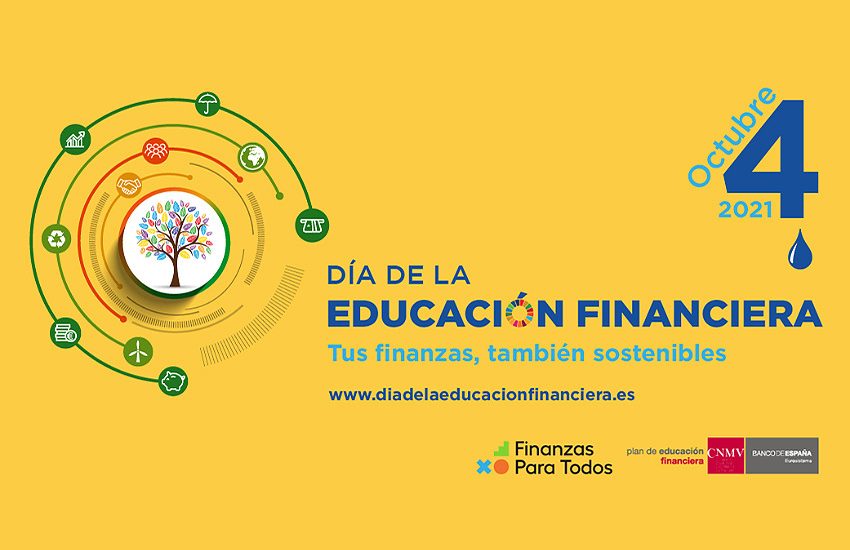Today, 4 October, we are celebrating, for the seventh consecutive year, Financial Education Day, an initiative promoted by the Bank of Spain and the Spanish National Securities Market Commission (CNMV) as part of the National Financial Education Plan 2018-2021, which was launched in 2015. The event is held every year on the first Monday of October, with activities taking place throughout the country, targeting all segments of the population, with the aim of raising awareness of the importance of being well-educated in order to be able to manage personal finances properly.
This year, with the slogan 'Your finances, also sustainable', it seeks to convey the importance of incorporating sustainability into personal finances. A relevant factor that needs to be taken into account in everyday life, given that any action undertaken not only has an impact on people's lives, but also has a significant impact on the environment and on the economy as a whole. To achieve a more sustainable world, plans need to be viable and environmentally friendly, a principle that also applies to the management of personal finances.
The fostering of financial education and the promotion of actions geared towards its implementation form part of the DNA of CECA's member entities. Specifically, for CaixaBank, Kutxabank, Cajasur Banco, Abanca, Unicaja Banco, Ibercaja Banco, Caixa Ontinyent, Colonya Pollença, Cecabank, CECA and Funcas, financial education is one of the main priorities, the purpose of which is twofold. On the one hand, to raise awareness among citizens of the importance of being financially educated in order to make their decisions and, on the other hand, to contribute to improving people's financial literacy so that they can act in a responsible and informed manner. A greater understanding of finance favours the stability of the financial system, and financial education is therefore a decisive instrument that can promote the improvement of citizens' well-being and foster equal opportunities. Under this premise, the following activities have been organised to celebrate Financial Education Day/Week 2021.
The importance of digital Despite the difficulties posed by the pandemic, financial institutions have displayed enormous adaptability in shifting a large part of their initiatives to an online format, thus facilitating access for the most vulnerable groups. As a result, 2020 stood out for its firm commitment towards digitalisation, with innovative initiatives that have prioritised the use of the different online channels. Thus, 86% of the total investment has been allocated to digital actions such as app development, websites, video games, virtual workshops or streaming broadcasts. Messages related to password management, monitoring network security, secure Internet browsing and online shopping, especially for seniors, have also been reinforced. In addition, the number of programmes designed for entrepreneurs, retailers, professionals and the self-employed, businesses and micro-enterprises has multiplied, in support of the groups most affected by the COVID-19 crisis. Similarly, there has been an increase in activities related to sustainability, cybersecurity and digitalisation, while the topics of savings, spending, budgeting and investment products and services have remained among the top activities developed due to the impact of the pandemic on family finances.
A long-standing engagement in line with the Sustainable Development Goals One of the priorities of CECA's member entities has always been to promote financial education. In the current context, this commitment is even greater, with the aim of conveying financial education to society, sharing its experience, knowledge and capillarity across the entire country. In Spain there is a national strategy boosted from 2008 by the Banco de España and the Comisión Nacional del Mercado de Valores (CNMV), which the mentioned companies
are part. Thus, since 2008, the sector has supported the three Financial Education Plans already approved and will again support the 2022-2025 Plan, which will be presented this autumn.
It should be noted that CECA's member entities and the association itself, as members of the Global Compact, contribute through their support for financial education to promoting the Sustainable Development Goals. In this manner, they promote quality education, decent employment and economic growth, reducing inequalities and supporting empowerment and gender equality, especially among the most vulnerable.
Funcas Educa Programme: the largest investment in Spain in financial education Through the 'Funcas Financial Education Stimulus Programme', a contribution is being made towards the financing of activities carried out by financial institutions, either directly or through their foundations, promoting existing projects or other new projects that meet the new needs detected in society. Looking at the last three years, these entities have allocated €12.35 million to promote financial education, in part thanks to the drive provided by the 'Funcas Educa Programme' which, with a budget of €9.47 million, has consolidated its position as the largest investment in financial education in Spain.
During the complex year 2020 alone, these entities have earmarked €3,574,774 to promote, foster and improve financial education. Of the total investment, €3.025 million came from the 'Funcas Educa Programme', promoted by CECA and Funcas for the third consecutive year. With this investment, a total of 4,145 activities were carried out. Financially responsible citizens who manage their resources in the most efficient way and who embrace digitalisation when it comes to disseminating knowledge and skills are vital to overcome the current situation.








